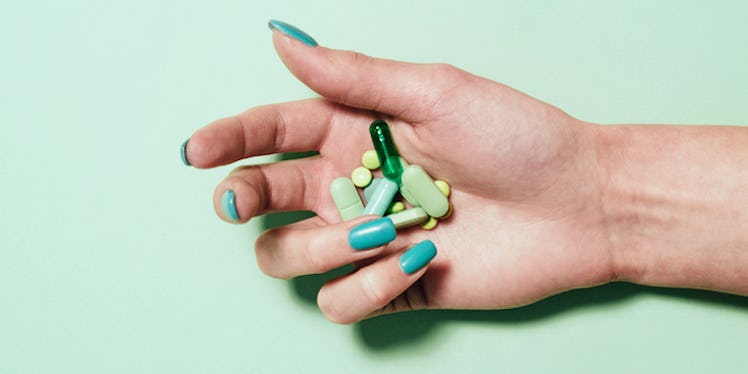
If Anti-Depressants Are Tanking Your Sex Drive, Here's What You Can Do About It
If you've been diagnosed with depression, you may be taking antidepressants to assist you in managing your mental health. One side effect of some antidepressants is a decreased sex drive, according to psychiatrist and co-founder of Neighborhood Psychiatry Grant H. Brenner, MD, FAPA. Whether you're in a monogamous relationship or have multiple sexual partners, you may feel as if your libido has changed due to your medication. If antidepressants are affecting your sex drive, there are ways to cope.
People can sometimes let their fear of side effects hinder them from seeking medication. But your health should be your priority, and getting treated for your depression is of utmost importance. If you do experience side effects, you want to make sure they're manageable and not preventing you from treating your depression.
So if you find that while on antidepressants, your sex drive isn't like it was pre-medication, fret not: there are things you can do to manage.
I spoke with Brenner about what you can do if you find antidepressants are affecting your libido. But if you aren't currently experiencing side effects, take note: Brenner says that 30 to 40 percent of people who take antidepressants will not experience a change in sex drive. Sixty percent of patients report decreased libido or delayed orgasm, and up to 30 percent have more severe difficulties. If you're among that group, read on for suggestions.
Talk to your psychiatrist.
Your decreased sexual drive could be due to a number of factors, and it may not be the actual antidepressant medication itself.
"While reduced libido is a common adverse reaction with antidepressants, it can also be a symptom of depression, and other psychiatric and general medical conditions which need to be checked before any medication changes are made," Brenner says.
He warns against jumping to conclusions about what's causing your lowered sex drive.
"Non-psychiatric medications can also reduce sex drive and impair sexual function, so check to see if other [medication] could be contributing before deciding it is from psychiatric medications," he says. "Because symptoms often return if [psychiatric medications] are stopped too soon, it's important to be thoughtful before making any changes, especially when we are upset about something personally significant like sex drive."
Wait it out.
This may not be ideal, but Brenner says that it's possible your sex drive could go up again after being on an antidepressant for several weeks. (In his science terms: "the body adjusts to the serotonergic effects of the medication.")
He does say, though, that your sex life also may improve as your psychology improves.
"Sometimes, when psychological and relationship issues improve for a couple, sexual satisfaction will improve as overall relationship quality improves. This is important because it highlights that even with some degree of antidepressant induced sexual dysfunction, couples may still enjoy healthy, active sex lives."
Visit a sex therapist.
Your antidepressants could be affecting your sex drive in a variety of ways, says Brenner, "For some people, they are unable to enjoy sex at all, experiencing minimal arousal and severely impaired sexual function. People may not, for example, be able to orgasm at all, or may not be able to engage in sexual intercourse. For others, sexual function is diminished, but intact."
He suggests visiting a sex therapist with your partner(s) to work out the change in your sex life, and targeting a specialized treatment for you and your partner(s) directly.
Change medications.
The science behind the change in your sex drive is due to serotonin.
"Serotonin is the main issue with antidepressants and sexual dysfunction," Brenner says. "Serotonin is a neurotransmitter involved with mood and anxiety, but it also is involved in the regulation of basic mammalian functions such as sex drive and appetite."
It is possible to switch to another antidepressant that may not affect your sex drive as much.
"Some antidepressants, such as Mirtazapine and Bupropion, appear to help offset reduced sex drive from first-line antidepressants."
You can talk with your psychiatrist to see if switching to another antidepressant is right for your needs.